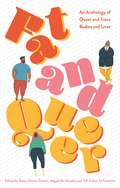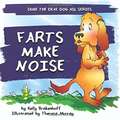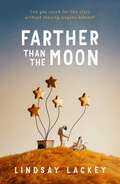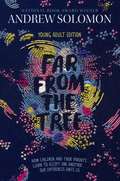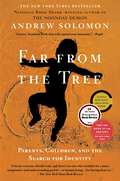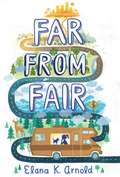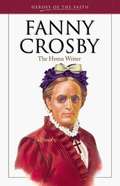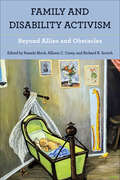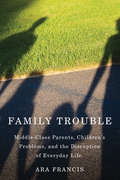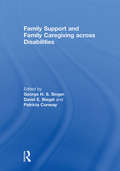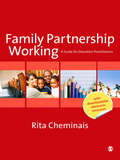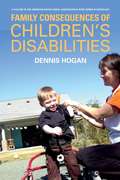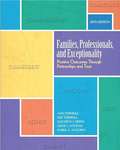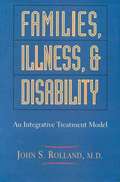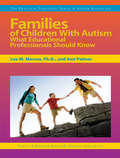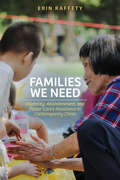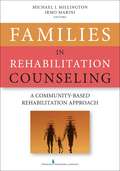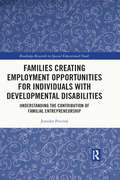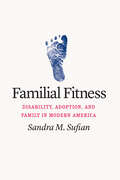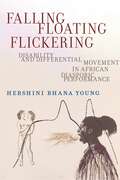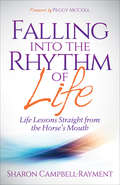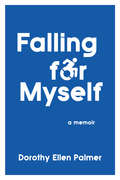- Table View
- List View
Fat and Queer: An Anthology of Queer and Trans Bodies and Lives
by Bruce Owens Grimm, Miguel M. Morales and Tiff Joshua TJ FerentiniWe're here. We're queer. We're fat.This one-of-a-kind collection of prose and poetry radically explores the intersection of fat and queer identities, showcasing new, emerging and established queer and trans writers from around the world.Celebrating fat and queer bodies and lives, this book challenges negative and damaging representations of queer and fat bodies and offers readers ways to reclaim their bodies, providing stories of support, inspiration and empowerment.In writing that is intimate, luminous and emotionally raw, this anthology is a testament to the diversity and power of fat queer voices and experiences, and they deserve to be heard.
Farts Make Noise (Duke The Deaf Dog ASL Series)
by Kelly BrakenhoffDuke the Deaf Dog learns that some noises are loud and some are quiet. Whether it's a tapping crayon, a beeping fire drill, or a crinkly candy wrapper, both parents and children alike will understand the need to know the difference between noises. A fun, engaging way to teach children that some noises are not polite. <P><P><i>Advisory: This book offers only partial accessibility. We have kept it in the collection because it is useful for some of our members. Benetech is actively working on projects to improve accessibility issues such as these in the future.</i>
Farther Than the Moon
by Lindsay LackeyFrom award-winning author Lindsay Lackey comes Farther Than the Moon, a heartfelt story about a boy who wants to become an astronaut, but wonders if his dreams can include his brother with disabilities, perfect for fans of We Dream of Space and Song for a Whale.All thirteen-year-old Houston Stewart has ever wanted is to become an astronaut. His dreams feel like they're finally coming true when he's accepted to the highly-competitive Junior Astronaut Recruitment Program – if only he could bring his little brother, Robbie, with him.Ever since their dad left, Houston and Robbie have been inseparable. It's hard to tell where Houston's love of space ends and where Robbie's begins. But Robbie's cerebral palsy and epilepsy mean he needs medical attention at home, so Houston must take this giant leap for the two of them all on his own.At camp, Houston is quickly drawn into the orbit of new friends, cosmic adventures, and a long-lost grandfather. But as Houston struggles to meet the program's rigorous demands, he’s forced to reckon with the truth that Robbie may never be able to visit space like the brothers have always hoped. But Houston is determined to honor Robbie’s dream, even if it seems like an impossible mission. So, like a good astronaut, he dares to make a new plan — one that shoots for the stars.Called "a remarkable and heartfelt story that is as fun and gripping as it is profoundly moving" by #1 New York Times-bestselling author Dan Gemeinhart, this is a captivating read for aspiring astronauts and scientists, and a perfect holiday gift.
Far from the Tree: Young Adult Edition--How Children and Their Parents Learn to Accept One Another . . . Our Differences Unite Us
by Andrew Solomon Laurie CalkhovenFrom New York Times bestselling author Andrew Solomon comes a stunning, poignant, and affecting young adult edition of his award-winning masterpiece, Far From the Tree, which explores the impact of extreme differences between parents and children.The old adage says that the apple doesn’t fall far from the tree, meaning that children usually resemble their parents. But what happens when the apples fall somewhere else—sometimes a couple of orchards away, sometimes on the other side of the world? In this young adult edition, Andrew Solomon profiles how families accommodate children who have a variety of differences: families of people who are deaf, who are dwarfs, who have Down syndrome, who have autism, who have schizophrenia, who have multiple severe disabilities, who are prodigies, who commit crimes, and more. Elegantly reported by a spectacularly original and compassionate thinker, Far From the Tree explores how people who love each other must struggle to accept each other—a theme in every family’s life. The New York Times calls the adult edition a “wise and beautiful” volume, that “will shake up your preconceptions and leave you in a better place.”
Far from the Tree: Parents, Children and the Search for Identity
by Andrew Solomon<P>From the National Book Award-winning author of The Noonday Demon: An Atlas of Depression comes a monumental new work, a decade in the writing, about family. <P>In Far from the Tree, Andrew Solomon tells the stories of parents who not only learn to deal with their exceptional children but also find profound meaning in doing so. Solomon's startling proposition is that diversity is what unites us all. <P>He writes about families coping with deafness, dwarfism, Down syndrome, autism, schizophrenia, multiple severe disabilities, with children who are prodigies, who are conceived in rape, who become criminals, who are transgender. While each of these characteristics is potentially isolating, the experience of difference within families is universal, as are the triumphs of love Solomon documents in every chapter. All parenting turns on a crucial question: to what extent parents should accept their children for who they are, and to what extent they should help them become their best selves. <P>Drawing on forty thousand pages of interview transcripts with more than three hundred families, Solomon mines the eloquence of ordinary people facing extreme challenges. Whether considering prenatal screening for genetic disorders, cochlear implants for the deaf, or gender reassignment surgery for transgender people, Solomon narrates a universal struggle toward compassion. Many families grow closer through caring for a challenging child; most discover supportive communities of others similarly affected; some are inspired to become advocates and activists, celebrating the very conditions they once feared. <P>Woven into their courageous and affirming stories is Solomon's journey to accepting his own identity, which culminated in his midlife decision, influenced by this research, to become a parent. Elegantly reported by a spectacularly original thinker, Far from the Tree explores themes of generosity, acceptance, and tolerance--all rooted in the insight that love can transcend every prejudice. <P>This crucial and revelatory book expands our definition of what it is to be human.
Far from Fair
by Elana K. ArnoldOdette Zyskowski has a list: Things That Aren't Fair. At the top of the list is her parents' decision to take the family on the road in an ugly RV they've nicknamed the Coach. There's nothing fair about leaving California and living in the cramped Coach with her parents and exasperating younger brother, sharing one stupid cell phone among the four of them. And there's definitely nothing fair about what they find when they reach Grandma Sissy's house, hundreds of miles later. Most days it seems as if everything in Odette's life is far from fair. Is there a way for her to make things right? With warmth and sensitivity, Elana K. Arnold makes the difficult topics of terminal illness and the right to die accessible to young readers.
Fanny Crosby: The Hymn Writer
by Bernard RuffinThis is a biography of Fanny Crosby, a blind prolific hymn writer in the 1800's. Many of her hymns are still sung today. This book is in the Heroes of the Faith Series
Family and Disability Activism: Beyond Allies and Obstacles
by Allison C. Carey Pamela Block Richard K. ScotchIn 2020, Pamela Block, Allison C. Carey, and Richard K. Scotch published Allies and Obstacles, which examined the tensions and connections between disability activism and parents of children with disabilities. In Family and Disability Activism, they continue to examine these issues with a focus on the path-breaking advocacy by marginalized activists with intersectional lived experiences. Family and Disability Activism reveals how families and disabled people who identify as BIPOC and/or LGBTQIA2S+ understand issues of rights versus justice. Contributions by Deaf and disabled activists emphasize the frequent need for either care or independence. Other chapters show how members of the disabled community and their families must navigate systemic issues of segregation, institutionalization, and access to special education services differently depending on their ethnic and racial identities. Expanding the conversation about disability, kinship, biological and chosen families, and activism, this volume amplifies important voices in the fight for disability rights. Contributors: Erin Compton, Diane Compton, Jaclyn Ellis, Laura LeBrun Hatcher, Elena Hung, Bridget Liang, Jenelle Rouse, Cheryl Najarian Souza, Jeneva Stone, Roger A. Stone, Lisette E. Torres, Grace Tsao, and the editors
Family Trouble
by Ara FrancisOur children mean the world to us. They are so central to our hopes and dreams that we will do almost anything to keep them healthy, happy, and safe. What happens, then, when a child has serious problems? In Family Trouble, a compelling portrait of upheaval in family life, sociologist Ara Francis tells the stories of middle-class men and women whose children face significant medical, psychological, and social challenges. Francis interviewed the mothers and fathers of children with such problems as depression, bi-polar disorder, autism, learning disabilities, drug addiction, alcoholism, fetal alcohol syndrome, and cerebral palsy. Children's problems, she finds, profoundly upset the foundations of parents' everyday lives, overturning taken-for-granted expectations, daily routines, and personal relationships. Indeed, these problems initiated a chain of disruption that moved through parents' lives in domino-like fashion, culminating in a crisis characterized by uncertainty, loneliness, guilt, grief, and anxiety. Francis looks at how mothers and fathers often differ in their interpretation of a child's condition, discusses the gendered nature of child rearing, and describes how parents struggle to find effective treatments and to successfully navigate medical and educational bureaucracies. But above all, Family Trouble examines how children's problems disrupt middle-class dreams of the "normal" family. It captures how children's problems "radiate" and spill over into other areas of parents' lives, wreaking havoc even on their identities, leading them to reevaluate deeply held assumptions about their own sense of self and what it means to achieve the good life. Engagingly written, Family Trouble offers insight to professionals and solace to parents. The book offers a clear message to anyone in the throes of family trouble: you are in good company, and you are not as different as you might feel...
Family Support and Family Caregiving across Disabilities
by George H. S. Singer David E. Biegel Patricia ConwayFamily members provide the majority of care for individuals with disabilities in the United States. Recognition is growing that family caregiving deserves and may require societal support, and evidence-based practices have been established for reducing stress associated with caregiving. Despite the substantial research literature on family support that has developed, researchers, advocates and professionals have often worked in separate categorical domains such as family support for caregiving for the frail elderly, for individuals with mental illness, or for people with development disabilities. Family Support and Family Caregiving across Disabilities addresses this significant limitation through cross-categorical and lifespan analyses of family support and family caregiving from the perspectives of theory and conceptual frameworks, empirical research, and frameworks and recommendations for improvements in public policy. The book also examines children with disabilities, children with autism, adults with schizophrenia, and individuals with cancer across the life cycle. This book was published as a two-part special issue in the Journal of Family Social Work.
Family Policy and Disability
by Arie RimmermanThis book explores the status and scope of family policies related to households of children with disabilities, providing an in-depth, evidence-based review of legal, programmatic issues. It includes a discussion of the gaps between family needs and contemporary family policies in the United States and European countries, as demonstrated in these households' surveys. In addition, the volume offers a comparative analysis of cash benefits, tax credits and deductions, and in-kind provisions between the United States and select European countries (UK, France, and Sweden). Most importantly, this book identifies and continues the discussion regarding the critical role of family-centered policies, as expressed in the United Nations Convention on the Rights of Persons with Disabilities (UNCRPD), as well as the future of family policy toward families of children with disabilities at a time of economic crisis.
Family Partnership Working: A Guide for Education Practitioners
by Rita CheminaisImproving the quality and effectiveness of relationships with families is a key concern for all those working in education. Here, Rita Cheminais provides an evaluation framework that will enable practitioners to review current practice, and further enhance and develop their partnership working with families. Six key themes of family partnership working are explored: - ethos, vision and policy - leadership, management and co-ordination - communication and information sharing - partnership in practice - early intervention - effectiveness. Guidance on auditing your own work and action planning is included, and the book provides a range of practical resources which are available to download from the SAGE website. This a vital handbook for those working with the Birth to 19 age range in Children's Centres, primary and secondary schools, special schools, academies, Pupil Referral Units and Further Education colleges.
Family Interventions Throughout Chronic Illness and Disability
by Paul W. Power Martha Blechar Gibbons Arthur E. Dell OrtoTextbook covering a wide range of disabilities and chronic illnesses. Intended for health, allied health, and other helping professionals.
Family Consequences of Children’s Disabilities
by Denis P. HoganThe Americans with Disabilities Act (ADA) and other national policies are designed to ensure the greatest possible inclusion of people with disabilities in all aspects of American life. But as a matter of national policy we still place the lion's share of responsibility for raising children with disabilities on their families. While this strategy largely works, sociologist Dennis Hogan maintains, the reality is that family financial security, the parents' relationship, and the needs of other children in the home all can be stretched to the limit. In Family Consequences of Children's Disabilities Hogan delves inside the experiences of these families and examines the financial and emotional costs of raising a child with a disability. The book examines the challenges families of children with disabilities encounter and how these challenges impact family life. The first comprehensive account of the families of children with disabilities, Family Consequences of Children's Disabilities employs data culled from seven national surveys and interviews with twenty-four mothers of children with disabilities, asking them questions about their family life, social supports, and how other children in the home were faring. Not surprisingly, Hogan finds that couples who are together when their child is born have a higher likelihood of divorcing than other parents do. The potential for financial insecurity contributes to this anxiety, especially as many parents must strike a careful balance between employment and caregiving. Mothers are less likely to have paid employment, and the financial burden on single parents can be devastating. One-third of children with disabilities live in single-parent households, and nearly 30 percent of families raising a child with a disability live in poverty. Because of the high levels of stress these families incur, support networks are crucial. Grandparents are often a source of support. Siblings can also assist with personal care and, consequently, tend to develop more helpful attitudes, be more inclusive of others, and be more tolerant. But these siblings are at risk for their own health problems: they are three times more likely to experience poor health than children in homes where there is no child with a disability. Yet this book also shows that raising a child with a disability includes unexpected rewards—the families tend to be closer, and they engage in more shared activities such as games, television, and meals. Family Consequences of Children's Disabilities offers access to a world many never see or prefer to ignore. The book provides vital information on effective treatment, rehabilitation, and enablement to medical professionals, educators, social workers, and lawmakers. This compelling book demonstrates that every mirror has two faces: raising a child with a disability can be difficult, but it can also offer expanded understanding. A Volume in the American Sociological Association's Rose Series in Sociology
Families, Professionals, and Exceptionality: Positive Outcomes Through Partnerships and Trust
by Ann Turnbull H. Rutherford Turnbull Elizabeth J. Erwin Leslie C. Soodak Karrie A. ShogrenThe best-known authors in the field of family and professional collaboration, this practical text instructs teachers, education professionals, and families on how to empower, collaborate, and advocate for children with special needs and how everyone involved can form lasting partnerships for the betterment of the children they live for and serve. The book has always been strong in its depiction of family systems theory, the history and current status of policy, and the principles of partnership and their application by teachers and other professionals, as well as the plethora of practical advice given to help educators find true ways to apply these principles on the job. The inclusion of authentic stories and genuine depictions of special needs people and their families only deepens the authenticity and richness of the narrative, and adds a unique and touching human element to the subject at hand. Backed by the most recent research and evidence-based practices, the authors have brought all citations and references in this edition up to date (2009). This new edition features: more families and their unique stories, including a Marine Corps family, and a single-parent family; more coverage of secondary students, and an overall broader range of disabilities; more cultural diversity and examples of families from different ethnic backgrounds; and the book now portrays a family's entire lifespan.
Families, Illness, and Disability: An Integrative Treatment Model
by John S. RollandWhen a family member is diagnosed with cancer or faces challenges from living with a disability, the impact reverberates throughout the family, leaving no one untouched. How should a clinician help the parents of a child who is critically ill? How can a marital relationship be skewed and a child's well-being compromised when a parent becomes permanently disabled-and how can a clinician best intervene in such cases? In presenting his clinically powerful Family Systems Illness Model, John Rolland addresses these and other vital questions of importance to families in which there is a member with a major illness or disability. Rolland's integrative treatment model is based on his experience with more than five hundred families, first as Founding Director of the Center for Illness in Families while at Yale University and currently at the University of Chicago. He applies it to a broad range of disorders that affect adults and children over the entire course of the life cycle. Richly illustrated with varied case examples, Families, Illness, and Disability is unique in describing this comprehensive model and in providing a highly practical guide to effective intervention. Through a normative, preventive lens, the book's useful framework shows how the biopsychosocial demands of different illness and disabilities create particular strains on the family, how the stages of an illness affect the family, how family legacies of loss and illness shape their coping responses, and how family belief systems play a crucial role in the ability to manage health and illness. Practitioners will learn how to help families live well despite physical limitations and the uncertainties of threatened loss, how to encourage empowering rather than shame-based illness narratives, how to rewrite rigid caregiving scripts, how to encourage intimacy and maximize autonomy for all family members. With its superb integration of individual and family modalities, this outstanding book is ideal for all health and mental health professionals and students who work with illness, disability, and loss in a wide variety of clinical settings.
Families of Children With Autism: What Educational Professionals Should Know
by Lee M. Marcus Ann PalmerThis text provides an overview of the role of educational professionals in the lives of families of children with autism.
Families We Need: Disability, Abandonment, and Foster Care’s Resistance in Contemporary China
by Erin RaffetySet in the remote, mountainous Guangxi Autonomous Region and based on ethnographic fieldwork, Families We Need traces the movement of three Chinese foster children, Dengrong, Pei Pei, and Meili, from the state orphanage into the humble, foster homes of Auntie Li, Auntie Ma, and Auntie Huang. Traversing the geography of Guangxi, from the modern capital Nanning where Pei Pei and Meili reside, to the small farming village several hours away where Dengrong is placed, this ethnography details the hardships of social abandonment for disabled children and disenfranchised, older women in China, while also analyzing the state’s efforts to cope with such marginal populations and incorporate them into China’s modern future. The book argues that Chinese foster families perform necessary, invisible service to the Chinese state and intercountry adoption, yet the bonds they form also resist such forces, exposing the inequalities, privilege, and ableism at the heart of global family making.
Families In Rehabilitation Counseling: A Community-Based Rehabilitation Approach
by Irmo Marini Michael J. MillingtonPresents an innovative family-based approach to rehabilitation counseling that can be put to use immediately While the family has traditionally been a secondary consideration in rehabilitation, this graduate text presents an innovative approach to rehabilitation counseling that focuses on the family as the center of a person-centered model, rather than as an adjunct to individual counseling. It advocates counseling in the context of community, requiring the recognition of social transaction as the primary focus of all interventions. The book provides the tools and knowledge base to effectively work with the family and within the community, delivering a new inclusive model of care and establishing best practices in research, practice, training, and management. The text examines the rationale for embracing family values in rehabilitation counseling and provides a framework that redefines the relationship between counselor and client in the context of family and community. It describes the community-based rehabilitation model in detail according to the International Classification of Function (ICF).
Families Creating Employment Opportunities for Individuals with Developmental Disabilities: Understanding the Contribution of Familial Entrepreneurship (Routledge Research in Special Educational Needs)
by Jennifer PercivalThis volume provides an in-depth, qualitative exploration of familial entrepreneurship as an innovative employment model, being established by families in response to difficulties faced by individuals with developmental disabilities in entering the labor market. Drawing on rich qualitative data collected via research with families, this volume explores how and why familial entrepreneurs in the United States have chosen to develop businesses to employ their loved ones. Chapters offer close analysis of the challenges and opportunities associated with familial entrepreneurship and highlight the ways in which this practice supports people with developmental disabilities by providing opportunities for skill development, social interaction, and participation in meaningful activity. Recognizing familial entrepreneurship as a new and distinct hybrid employment model, the text goes on to consider how curricula, policy, and state services might better support families and underpin this form of inclusive work. The volume provides important conclusions that contribute to the fields of Disability Studies, Entrepreneurship, Inclusive Education, Adult Education, Exceptional Student Education, Transition, and Vocational Rehabilitation. It is a key reading for scholars in these fields and across Education more widely.
Familial Fitness: Disability, Adoption, and Family in Modern America
by Sandra M. SufianThe first social history of disability and difference in American adoption, from the Progressive Era to the end of the twentieth century. Disability and child welfare, together and apart, are major concerns in American society. Today, about 125,000 children in foster care are eligible and waiting for adoption, and while many children wait more than two years to be adopted, children with disabilities wait even longer. In Familial Fitness, Sandra M. Sufian uncovers how disability operates as a fundamental category in the making of the American family, tracing major shifts in policy, practice, and attitudes about the adoptability of disabled children over the course of the twentieth century. Chronicling the long, complex history of disability, Familial Fitness explores how notions and practices of adoption have—and haven’t—accommodated disability, and how the language of risk enters into that complicated relationship. We see how the field of adoption moved from widely excluding children with disabilities in the early twentieth century to partially including them at its close. As Sufian traces this historical process, she examines the forces that shaped, and continue to shape, access to the social institution of family and invites readers to rethink the meaning of family itself.
Falling, Floating, Flickering: Disability and Differential Movement in African Diasporic Performance (Crip #7)
by Hershini Bhana YoungInsists on the importance of embodiment and movement to the creation of Black socialityLinking African diasporic performance, disability studies, and movement studies, Falling, Floating, Flickering approaches disability transnationally by centering Black, African, and diasporic experiences. By eschewing capital’s weighted calculus of which bodies hold value, this book centers alternate morphologies and movement practices that have previously been dismissed as abnormal or unrecognizable. To move beyond binaries of ability, Hershini Bhana Young traverses multiple geohistories and cultural forms stretching from the United States and the Mediterranean to Sierra Leone, Nigeria, and South Africa, as well as independent and experimental film, novels, sculptures, images, dance, performances, and anecdotes. In doing so, she argues for the importance of differential embodiment and movement to the creation and survival of Black sociality, and refutes stereotypic notions of Africa as less progressive than the West in recognizing the rights of disabled people. Ultimately, this book foregrounds the engagement of diasporic Africans, who are still reeling from the violence of colonialism, slavery, poverty, and war, as they gesture toward a liberatory Black sociality by falling, floating, and flickering.
Falling into the Rhythm of Life: Life Lessons Straight from the Horse's Mouth
by Sharon Campbell-RaymentIn every tragedy there is the ability to heal and rise above the challenge. In Falling into the Rhythm of Life, author Sharon Campbell-Rayment leads readers through her personal story of a devastating accident and her path to healing and recovery. She also provides readers with helpful lessons, tips and techniques called – Life Lessons Straight From the Horse's Mouth – written to equip readers on their own journeys.
Falling into Life
by Leonard KriegelLeonard Kriegel writes essays about his struggles with being a man and having polio.
Falling for Myself
by Dorothy Ellen PalmerIn this searing and seriously funny memoir, Dorothy Ellen Palmer falls down, a lot, and spends a lifetime learning to appreciate her disability. Born with two very different, very tiny feet, she was adopted as a toddler by an already wounded 1950s family. From childhood surgeries to decades as a feminist teacher, mom, improv coach and unionist, she tried to hide being different. But now, standing proud with her walker, she's sharing her journey. Navigating abandonment, abuse and ableism, she finds her birth parents and a new chosen family in the disability community.
